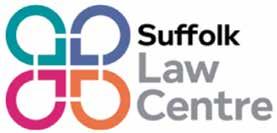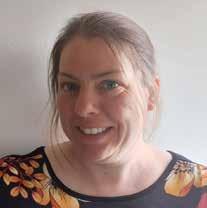
4 minute read
Suffolk Law Centre - Introducing our new Justice First Fellow Karis le Winton
Introducing our new Justice First Fellow, Karis le Winton
Tel: 01473 408 111 Fax: 08723529201 web: www.iscre.org.uk
ISCRE 46a St Matthews St. Ipswich Suffolk IP1 3EP
(Suffolk Law Advice Clinics & Tackling Discrimination in the East)

Suffolk Law Centre has once again been lucky enough to be funded to host a Justice First Fellow, a scheme to recruit and train some of the social welfare lawyers needed going forward, at a time when recruitment is getting much harder. The Fellowship, administer by the Legal Education Foundation is is made up of four integrated parts:
• Training contract: a two year fully funded training contract in any UK nation, and a free place on the Professional Skills Course at BPP campuses or equivalent compulsory training in Scotland or Northern Ireland.
• Project: Fellows develop a project with the support and input of their host organisation. Projects help advance access to justice and can potentially provide a future income stream for the host organisation.
• Extra support: Fellows and hosts attend regular sessions on developing their project, professional development skills, additional training, e.g. marketing and fundraising, well-being support provided by Claiming Space, and access to useful networks.
• Joining a cohort: Fellows build important relationships with their cohort which gives them essential peer support throughout their training contract. They continue to be part of the JFF alumni following qualification. Hosts join a national network of organisations committed to supporting the next generation of social welfare lawyers. for human habitation. I want to use this lived experience to give people a compassionate and understanding ear.
I worked in a care home and the care the residents received was far below the standards they should have been. I then committed myself to helping residents’ families via charities that help people to stop being abused and receive better care.
After several years of working with the national charity Compassion in Care helping carers with whistleblowing and employment issues, I was convinced the legal profession is the career I wanted. I left secondary school at age 13 without qualifications and went to work. I returned to education at University level based on the practical experience I had obtained working for the charity and writing an entrance essay.
I am excited for my future career at Suffolk Law Centre which shares my values. I see this as an opportunityto contribute to pioneering and effective service. I am delighted to go into work every day, making a difference to clients and the community whilst growing professionally.
My project aim is to improve people’s ability to find us and access our services. This will entail undertaking research on the current user journey from finding the Law Centre both digitally and physically through to making contact with the appropriate party at the Law Centre. The project will question the already established structures and pathways efficacy and explore how people currently make use of them as well as the ease of use. A key part will be identifying any current barriers within the existing structure that stop people from searching us out for legal assistance when they need it.
So Karis le Winton joined us in January and will get a variety of experience at Suffolk Law Centrte before qualifying in January 2024, likely to be including discrimination and employment, housing and family.
By way of an introduction to her and her proposed project, she writes...
“My interest in social welfare law stems from my own experience, I believe a civil society cares for its most vulnerable and believe we as a nation need to do better in the area of health and social care. When considering accessibility it is not just physical access, it is the unseen and conflicting areas of accessibility, for example, large lettering needed for the sight impaired could hinder the sensory sensitive. It is about the whole journey of a user, from when they contact us, how they contact us and all the way through their case to the resolution and our ability to best serve their needs on that journey.
I will first conduct a number of semi structured interviews with clients, previous clients, potential clients, staff and stake holders. These interviews will ascertain their experience in what they believe to be the key barriers to our services and identify any choke points where we might lose people in the user journey process. A comparative study of other organizations alongside discussions with them on the subject of how they planned for accessibility will help us to make plans and adapt for the future. We will also look at how we can be assisted by technology, whilst being cautious and ask how this impacts accessibility? I will be starting with the services we offer, and how we communicate them to everybody, as well as making recommendations to the board on some of the accessibility steps that we can take over the next two years. Then evaluate the efficiency of these recommendations in practice.“










